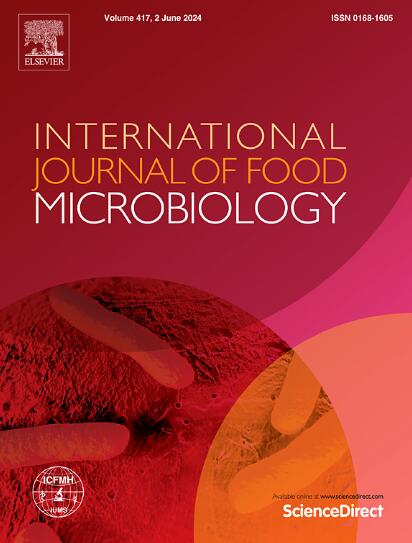The culturability of acid-tolerant Salmonella in mayonnaise, a raw egg-based sauce
IF 5
1区 农林科学
Q1 FOOD SCIENCE & TECHNOLOGY
International journal of food microbiology
Pub Date : 2025-02-02
DOI:10.1016/j.ijfoodmicro.2024.111000
引用次数: 0
Abstract
Salmonella is one of the most common bacterial foodborne pathogens and is frequently found as a contaminant of raw egg-based foods. Food safety regulations recommend the use of food acids to mitigate the risk of Salmonella persistence in raw egg-based foods. Salmonella, however, can become tolerant to acidic environments and it is not known how this can affect bacterial persistence in food. This study investigated whether acid-tolerant strains of Salmonella persisted longer in mayonnaise compared with sensitive strains. Isolates of S. typhimurium, S. infantis, S. enteritidis, and S. hessarek were used in this project. Acid-tolerant Salmonella strains were generated using a three-day step-down method where pH was decreased every 24 h from pH 7 to pH 5. Growth curves were determined for both acid-sensitive and acid-tolerant strains. Time-kill experiments were conducted to compare the survivability of acid-sensitive and acid-tolerant Salmonella serotypes in mayonnaise stored at either 5 °C or 25 °C for 72 h. Salmonella exhibited an extended lag phase with increased acid concentration, and acid-tolerant strains recovered faster in media compared with acid-sensitive strains. Elevated biofilm formation was found in acid-habituated strains compared to sensitive strains, and this varied between serotypes. The culturability of Salmonella in mayonnaise stored at 5 °C declined slower than when stored at 25 °C. Acid-tolerant strains persisted longer in mayonnaise and there was a statistically significant difference in culturability (P < 0.05). In conclusion, the current safe food recommendations to control Salmonella in raw egg-based foods are not effective in eliminating it.
耐酸沙门氏菌在蛋黄酱(一种以鸡蛋为原料的酱)中的培养能力。
沙门氏菌是最常见的细菌性食源性病原体之一,经常被发现是生鸡蛋类食品的污染物。食品安全法规建议使用食品酸来降低生鸡蛋类食品中沙门氏菌持续存在的风险。然而,沙门氏菌可以耐受酸性环境,目前尚不清楚这是如何影响食物中细菌的持久性的。这项研究调查了耐酸沙门氏菌菌株是否比敏感菌株在蛋黄酱中存活的时间更长。本研究采用鼠伤寒沙门氏菌、婴儿沙门氏菌、肠炎沙门氏菌和黑沙克沙门氏菌分离株。耐酸沙门氏菌菌株采用三天降压法产生,其中pH每24小时从pH 7降至pH 5。测定了耐酸菌株和酸敏感菌株的生长曲线。通过时间杀伤实验比较了酸敏感沙门氏菌和耐酸沙门氏菌血清型在蛋黄酱中5°C或25°C保存72 h的生存能力。随着酸浓度的增加,沙门氏菌的滞后期延长,耐酸菌株在培养基中恢复的速度比酸敏感菌株快。与敏感菌株相比,在酸习惯菌株中发现生物膜形成升高,并且在不同的血清型中有所不同。沙门氏菌在蛋黄酱中5℃贮藏时的培养率比25℃贮藏时下降得慢。耐酸菌株在蛋黄酱中存活时间更长,培养能力差异有统计学意义(P
本文章由计算机程序翻译,如有差异,请以英文原文为准。
求助全文
约1分钟内获得全文
求助全文
来源期刊
CiteScore
10.40
自引率
5.60%
发文量
322
审稿时长
65 days
期刊介绍:
The International Journal of Food Microbiology publishes papers dealing with all aspects of food microbiology. Articles must present information that is novel, has high impact and interest, and is of high scientific quality. They should provide scientific or technological advancement in the specific field of interest of the journal and enhance its strong international reputation. Preliminary or confirmatory results as well as contributions not strictly related to food microbiology will not be considered for publication.

 求助内容:
求助内容: 应助结果提醒方式:
应助结果提醒方式:


